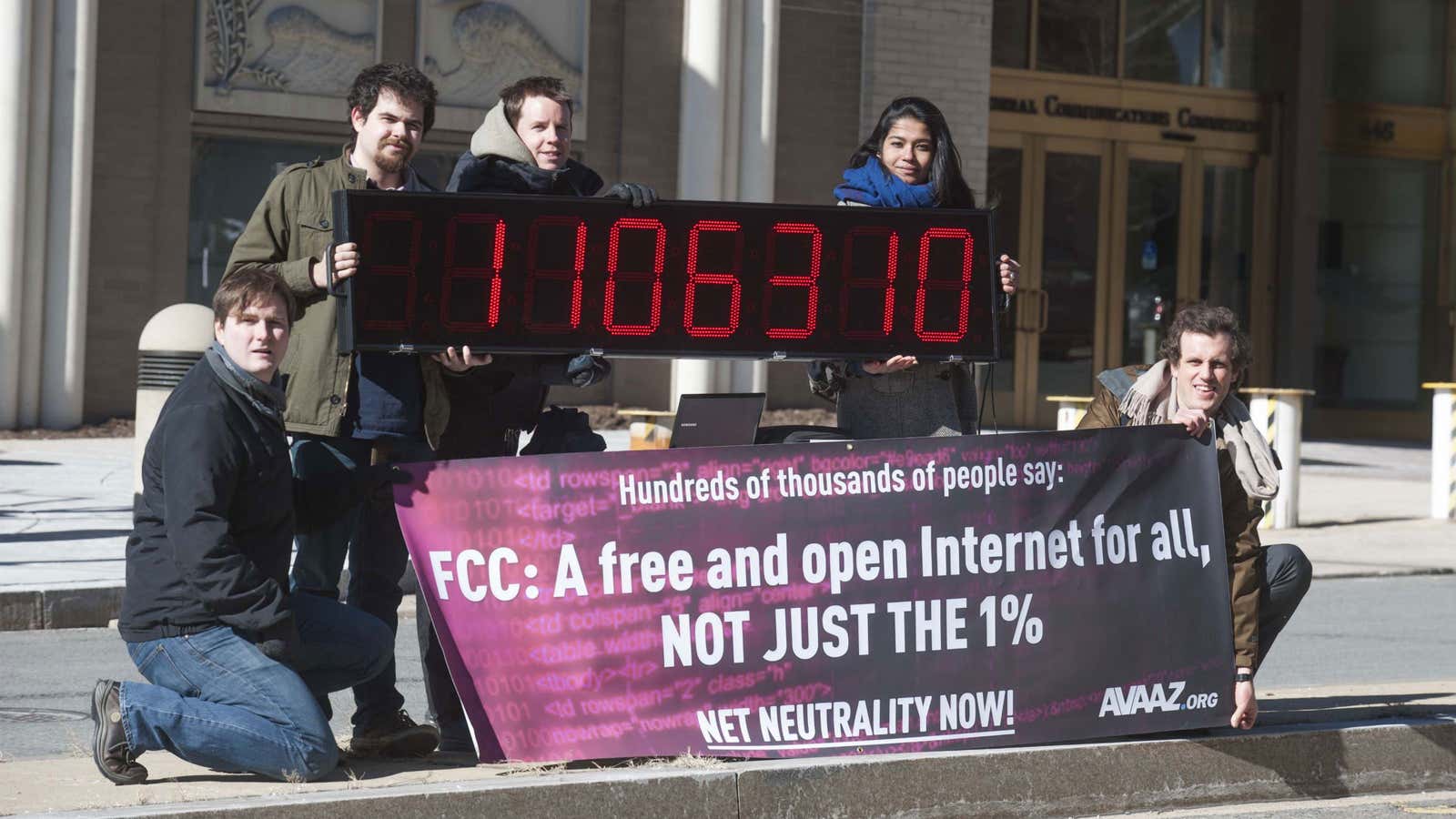Welcome to Occupy Inc.
US Federal Communications Commission chair Tom Wheeler’s proposals last week against ”net neutrality”—the principle that all internet traffic should be treated equally regardless of source—created a wave of internet traffic in its own right. Wheeler’s new proposal, that internet service providers can prioritize some sites’ traffic over others by allowing bandwidth-guzzling sites such as Netflix to pay a premium for optimal speed (but not restrict access to lawful sites altogether), is a virtual about-face from the FCC’s 2009’s edict that ISPs “must treat lawful content, applications, and services in a nondiscriminatory manner.” The FCC’s inconsistency has not gone unnoticed—with companies ranging from web behemoths like Facebook and eBay joining forces with social responsibility titans like CREDO Mobile and a myriad of startups to oppose the new FCC ruling. Critics say that such the FCC’s two-tiered “fast lane” framework—where the haves stream video in HD and the have-nots are relegated to slower speeds—would make it virtually impossible for Netflix-esque startups to take shape – “…if deep-pocketed players can pay for a faster, more reliable service, then small startups face a crushing disadvantage,” says one venture capitalist.
And with one government statement, net neutrality has become the new income inequality, the cause celebre of the progressive activist — and for the first time, the offices of Big Technology are allied with the tents of Occupy.
Last week saw the birth of the #OccupyTheFCC movement and a protest movement began camping on on the steps of the FCC’s Washington, DC headquarters. True to Occupy form, daily (and nightly) “actions” have punctuated the FCC’s daily operations since last Wednesday. From banners and greeting workers daily with a “human firewall” outside of the front entrance, to citywide awareness-driving PSA campaigns, to highway overpass signs, the movement is picking up steam heading into day eight. They’re “not going away anytime soon.” Its organizers, Fight for the Future, are no strangers to online protest, having risen to prominence in 2011 through the viral anti-SOPA “blackout” widget, was adopted by everyone from Google to Wikipedia in a coordinated effort against the unpopular “anti-piracy” legislation.
This Thursday—when the FCC is slated to release its proposal on net neutrality guidelines—is scheduled to see an escalation in dissent, with both organizing group the People’s Firewall and vigilante group Anonymous calling for a Americans to “show up at your local FCC office at noon on the 15th.” The FCC, to its credit, took to social media today to stem the tide—with FCC special counsel Gigi Sohn taking to Twitter today to diffuse animus by reminding users that Thursday’s proposal will address public concerns such as reclassification of broadband providers as “common carriers” of utility akin to a phone company, asking the public whether Section 706 of the Telecommunications Act would be a better route to an open internet, and ensuring equal broadband access to communities of color—but even with such caveats, some tweeters were not buying it.
When I was involved in the technical operations side of Occupy Wall Street back in 2011, multinational corporations—certainly those of the stature of Google or Dropbox—were decidedly persona non grata on the online side of things. Occupy was the quintessential movement of the “people,” of the 99%, and what could be more 1% than a personified billionaire corporation? “The people” and “big business” were decidedly on opposite sides of a shrinking table—and it was up to “the people” to make their voices heard against the forces of plutocracy.
#OccupyTheFCC, however, is a different entity entirely—and it seems Net Neutrality may have been the one issue to unite both occupied and occupier.
For the first time, the voices of Occupy protestors are echoing the sentiments of the big corporate players: Ebay, LinkedIn and Facebook have all likewise expressed “support for a free and open internet.” Today, as opposed to Zuccotti Park protesters near Wall Street, #OccupyTheFCC protestors are greeted with a cheery “Hi” from FCC employees upon entrance. Swiss tech company Golden Frog had pizza delivered to protestors today, and one tweeter even accused Google of paying for protestors’ tents. Indeed, as Justin Fox at Harvard Business Review points out, it is ironic that Google, the company so aligned with “the people” (and whose CEO one self-styled “founder” of OWS wants to rule America) in this issue has twice the market capitalization of its “evil” counterpart Comcast—the #OccupyTheFCC movement, then, essentially “pits one set of gigantic capitalist entities that happen to be preferred by Democratic politicians against another set preferred by the Republicans.”
In this respect, the People’s Fiber is a far cry from the People’s Microphone. And it may just be this fact that will make #OccupyTheFCC more successful than its Wall Street predecessor. The union of innovation-centered digital powerhouses, old-fashioned grassroots culture-jamming and protesting, and targeted social media are proving to be just the cocktail to force the FCC to reconsider its position. This may be the combo that is making FCC commissioners step out of their offices and take notice. Whether this union is the result of “activists [having] garnered support” of big tech companies, or the realization of a common goal of tollkeeper-free data transmission is anyone’s guess at this point.
One thing seems to be proving true, however: The people and the corporation—united—will never be defeated.




